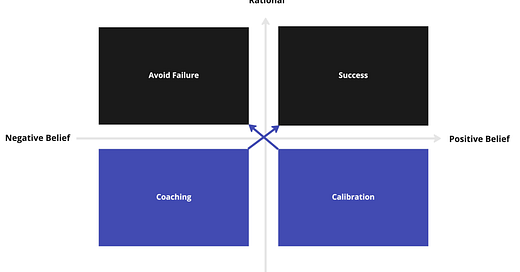Beliefs need to be recalibrated over time
The significant role that our beliefs play in our outcomes.
When I was 24-years-old, I believed that the launch of the iPad was going to be the next big tech innovation and would unlock a new category of gaming. I believed that I could launch a word game that could outperform the more established gaming studios if I moved quickly. These beliefs led me to putting in the work needed to launch an iPad game called Word Seek, and this game became the #1 or #2 iPad word game competing daily with Scrabble for a period of time.
When the app was at the top of the app store, I did not believe that it was possible to succeed much further. I did not believe it would be possible to support a team of small developers based on revenue projections. This resulted in me moving to another venture and not capitalizing on the full opportunity. Despite this, we reached over 800m+ games played as a passive pursuit and conceded our category position.
My beliefs influenced my actions, and these actions led to success. My beliefs also restricted actions, and inaction led to missed opportunities.
Beliefs can protect us from failure
Beliefs provide the basic guardrails for everything that we do. If we believe that we can’t achieve something, we will stop before we start. In many cases, this is rational and protects us from failure as a defense mechanism.
For many leaders, it’s common to be capable of success and have irrational beliefs that hold them back. It can be essential to have a coach who has gone through similar struggles, can provide encouragement, and help unlock latent potential that is not being realized.
Similar to having a personal trainer at the gym, the coach encourages the leader to keep going when they’re about to give up, adjusting form and helping to achieve what they didn’t believe was possible.
Rational positive beliefs lead to success
As Andy Grove puts it in his book, High Output Management, success occurs when both motivation and ability are present. Motivation occurs when someone believes they can achieve something meaningful, and the belief is rational when they have the ability to do so.
If someone believes that they can achieve something meaningful, they will take the step forward to get there. And if the steps get them closer to the goal, their beliefs can get stronger and create more momentum. This feedback loop is powerful and can snowball into achieving incredible feats.
Irrational positive beliefs need to be calibrated over time
The realities of the past may not be the realities of the future. This could be a gradual change that happens slowly over the years, or a sudden change that happens overnight. These events require our beliefs to be recalibrated. This can be painful and cause frustration since it may require re-learning things that worked well in the past.

In my experience, recalibration requires people to go through the emotion of grief to break through (see Kübler-Ross Model above). The faster leaders go through this cycle, the faster they’ll be able to lead their teams effectively.
Conclusion
Our beliefs form the basis of everything. To maximize success, it is important for beliefs to stay calibrated with reality. This means understanding what beliefs are rational and irrational, staying grounded when things change, and internalizing change quickly.





